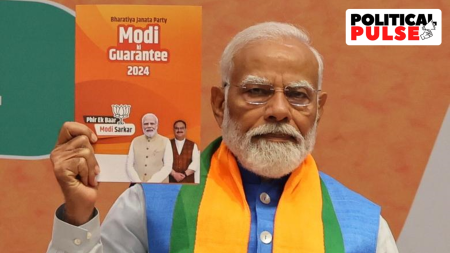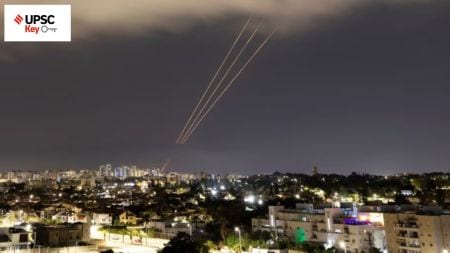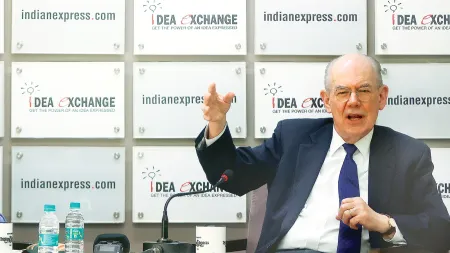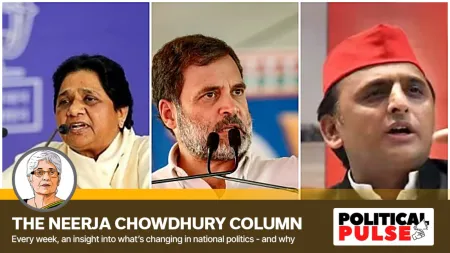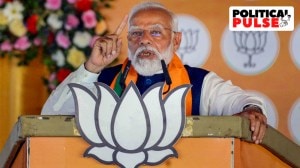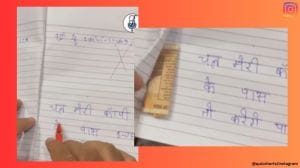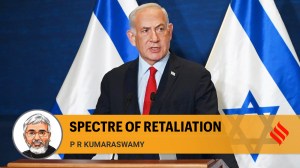- India
- International
Finally, WHO clears India’s homemade Covaxin for global use; eases overseas travel & export
No clearance during pregnancy yet; WHO sought vaccine data 9 times
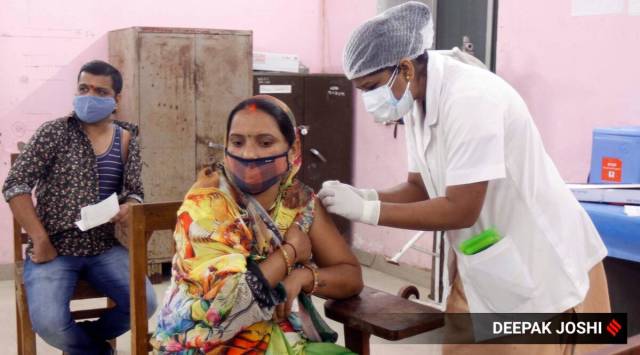 The WHO's decision implies that indigenously developed Covaxin meets the standards set by it for protection against the coronavirus disease. (Express file photo)
The WHO's decision implies that indigenously developed Covaxin meets the standards set by it for protection against the coronavirus disease. (Express file photo)The World Health Organisation (WHO) on Wednesday granted Emergency Use Listing (EUL) for Covaxin, the Covid-19 vaccine developed by the Indian Council of Medical Research (ICMR) and Hyderabad-based Bharat Biotech.
The WHO’s decision implies that indigenously developed Covaxin meets the standards set by it for protection against the coronavirus disease.
It also removes to a large extent the uncertainty around overseas travel by Indians who have been vaccinated with Covaxin.
Glad to see one more vaccine, #Covaxin, being granted @WHO emergency use listing. The more products we have to fight #COVID19, the better, but we must keep up the pressure to deliver #VaccinEquity & prioritize access to vulnerable groups who are still waiting for their 1st dose. https://t.co/wCgtSSNvJ1
— Tedros Adhanom Ghebreyesus (@DrTedros) November 3, 2021
Thirty-eight countries that have bilateral agreements with India currently recognise Covaxin; the WHO clearance is likely to prompt many other countries around the world to open their doors to those inoculated with the vaccine.
India has so far administered 12.14 crore doses of Covaxin across the country. The WHO’s decision has come more than fours months after it started conducting emergency use listing (EUL) assessment for global use of the vaccine.

“This emergency use listing expands the availability of vaccines, the most effective medical tools we have to end the pandemic,” Dr Mariângela Simão, WHO assistant director general for access to medicines and health products said in a statement.
“But we must keep up the pressure to meet the needs of all populations, giving priority to the at-risk groups who are still waiting for their first dose, before we can start declaring victory.”
Top government sources recalled that Wednesday’s EUL had come at the end of detailed scientific scrutiny — WHO had sought information related to Covaxin’s assessment from Bharat Biotech no less than nine times since July 5.
“On nine different occasions the WHO specifically asked the manufacturer to submit additional written information on Covaxin. On all nine occasions, the manufacturers very promptly furnished all the information. These were formal data on additional data and analysis,” a senior government official said.
In a statement, Dr Krishna Ella, chairman and managing director of Bharat Biotech, said, “Validation by WHO is a very significant step towards ensuring global access to India’s widely administered, safe, and efficacious Covaxin.
“As an organisation, we have focused on maintaining stringent quality and safety standards that meet rigorous assessment, and scientific standards established by WHO, as a result, many of our vaccines have received WHO prequalification.
“The EUL authorisation for Covaxin will enable us to contribute to accelerating the equitable access of Covid-19 vaccine, and the access to our vaccine globally thereby addressing the current public health emergency.”
The EUL is a scientific assessment of the safety, efficacy, and, quality of Covid-19 vaccines, and allows countries to fast-track their own regulatory approvals to import and administer these products.
🆕 WHO has granted emergency use listing (EUL) to #COVAXIN® (developed by Bharat Biotech), adding to a growing portfolio of vaccines validated by WHO for the prevention of #COVID19. pic.twitter.com/dp2A1knGtT
— World Health Organization (WHO) (@WHO) November 3, 2021
“WHO has granted emergency use listing (EUL) to Covaxin adding to a growing portfolio of vaccines validated by WHO for prevention of Covid-19,” the WHO said in a tweet.
It said that its Technical Advisory Group (TAG) — made up of regulatory experts from around the world — had determined that “the benefit of the vaccine far outweighs risks & the vaccine can be used”.
WHO also said that its Strategic Advisory Group of Experts (SAGE) on Immunisation had reviewed the vaccine and recommended its use in two doses, with a dosing interval of four weeks in all age groups 18 and above.
However, “available data on vaccination of pregnant women” with Covaxin “are insufficient to assess vaccine safety or efficacy in pregnancy”, the WHO said. “…Studies in pregnant women are planned, including a pregnancy sub-study and pregnancy registry,” it said.
🆕 WHO has granted emergency use listing (EUL) to #COVAXIN® (developed by Bharat Biotech), adding to a growing portfolio of vaccines validated by WHO for the prevention of #COVID19. pic.twitter.com/dp2A1knGtT
— World Health Organization (WHO) (@WHO) November 3, 2021
The WHO’s EUL is a prerequisite for a vaccine to be part for the Covax supply. However, sources said, “Covax first needs to enter into an agreement (with Bharat Biotech) which they have not done so far”. Therefore, “even if Bharat Biotech wants, they cannot at present supply vaccines to Covax,” the sources said.
According to the sources, Bharat Biotech has so far exported 10 lakh doses to the South American nation of Paraguay, and that Wednesday’s decision would enable more countries to request the manufacturer for export of Covaxin.
Wednesday’s decision constitutes the first WHO approval for a Covid-19 vaccine developed using the inactivated or killed virus along with certain chemicals. The production of such vaccines requires stringent procedures to avoid and check for contamination.
Covaxin was granted emergency use authorisation by the Drug Controller General of India in January. The clearance was in “clinical trial mode”, wherein Bharat Biotech had to obtain informed consent before administering the vaccine to those eligible for the government’s vaccination drive.
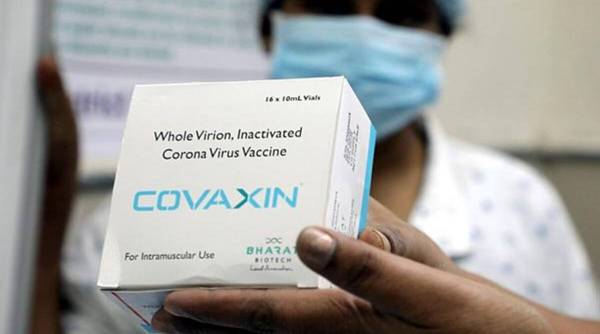 Covaxin accounts for 11% of the 985.5 million total doses administered in India, and has also been exported. (File)
Covaxin accounts for 11% of the 985.5 million total doses administered in India, and has also been exported. (File)
The regulator had granted approvals based only on immunogenicity, the ability to trigger an immune response, and safety data generated in phase 1 and 2 clinical trials.
The regulator had then said that permission had been given in the public interest, “especially in the context of infection by mutant strains”. However, the grant of emergency approval in the absence of efficacy data, which is generated during phase 3 human clinical trials, had raised concerns.
Two months later, in March, the company released the efficacy data, which showed an efficacy of 78% against Covid-19 of any severity — and the regulator dropped the clinical trial mode.
On October 12, the Subject Expert Committee (SEC) recommended the grant of EUA to Covaxin for use in the age group of 2-18 years. The regulator and two expert groups in the Health Ministry are currently scrutinising the data on Covaxin’s children’s clinical trial, and the global data on Covid-19 vaccination among children.
Last month, the WHO had said it could not “cut corners”, and that the timeframe for granting EUL was dependent on how quickly vaccine manufacturers were able to provide the required data.
“We are aware that many people are waiting for WHO’s recommendation for Covaxin to be included in the #COVID19 Emergency Use Listing, but we cannot cut corners — before recommending a product for emergency use, we must evaluate it thoroughly to make sure it is safe and effective,” the WHO had said on Twitter.
Earlier on Wednesday, the Central Drugs Standard Control Organisation (CDSCO) had approved extension of the shelf life of Covaxin up to 12 months from the date of manufacture.
“This approval of shelf life extension is based on availability of additional stability data which was submitted to CDSCO,” a statement from Bharat Biotech said.
Dr R R Gangakhedkar, former ICMR chief of epidemiology and communicable diseases, said: “This is the first completely indigenous vaccine based on a safe vaccine platform. It will help us expand ‘vaccine maitri’ too.”
Dr Samiran Panda, ICMR’s current chief of epidemiology and communicable diseases, told The Indian Express that WHO approval for the indigenous Indian vaccine “underlines the prowess of scientists and public health practitioners from within India who spearheaded the vaccine development process, catalysed proactive regulatory response and designed innovative intervention measures to deal with vaccine hesitancy”.
Apr 16: Latest News
- 01
- 02
- 03
- 04
- 05




